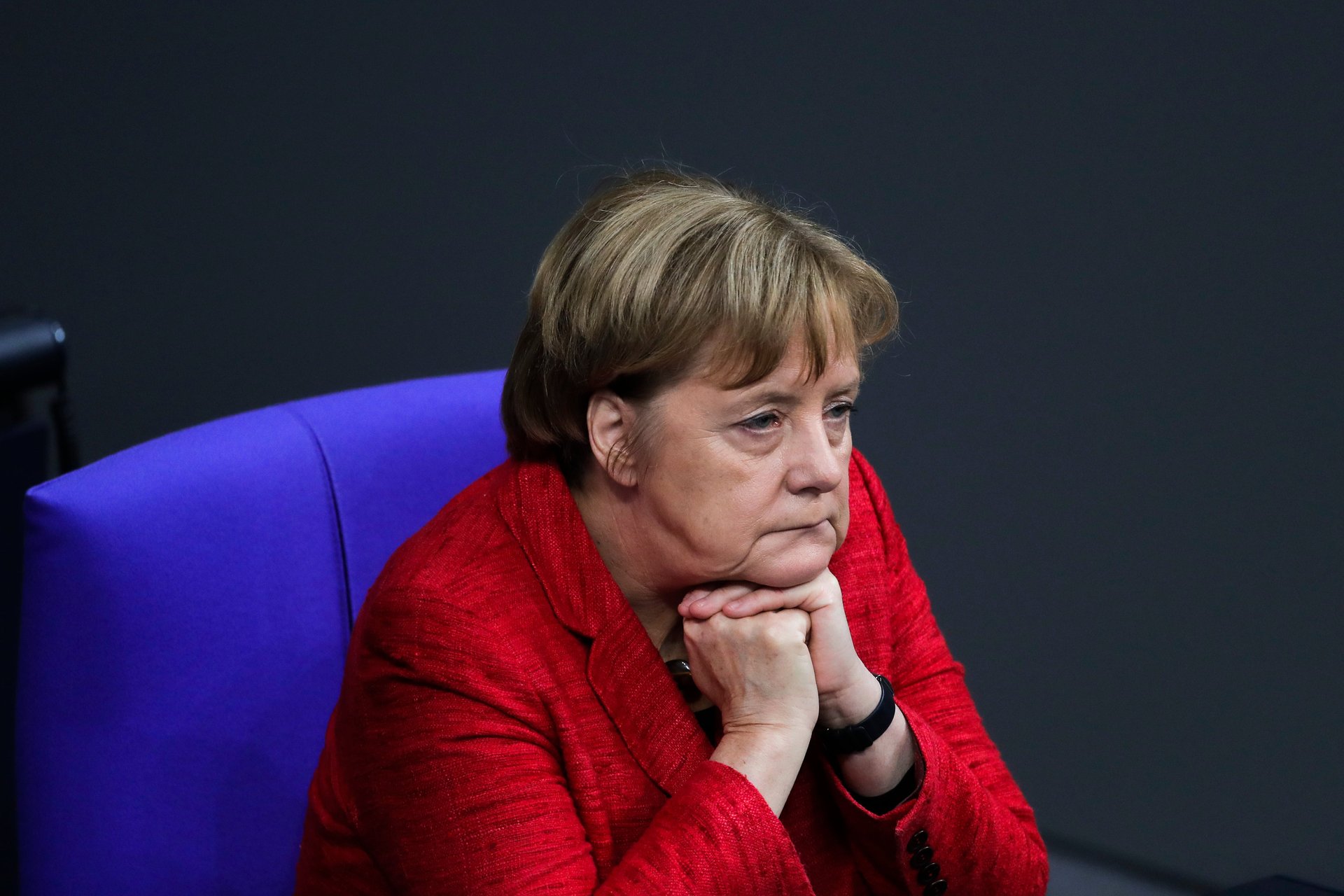Another German election risks boosting the far-right and ending Merkel’s career
Europe’s most prosperous country had a rude awakening on Monday when talks between the three parties trying form the next government fell apart after five weeks of wrangling. Two months after her Christian Democrats suffered a disappointing election result, the German chancellor—known for her negotiation skills—failed to broker an agreement between her party, the Christian Social Union, the Free Democrats and the Greens.


Europe’s most prosperous country had a rude awakening on Monday when talks between the three parties trying form the next government fell apart after five weeks of wrangling. Two months after her Christian Democrats suffered a disappointing election result, the German chancellor—known for her negotiation skills—failed to broker an agreement between her party, the Christian Social Union, the Free Democrats and the Greens.
From being lauded as the “eternal” chancellor and leader of the free world, Merkel is now locked in a battle to retain her power as her fourth term is no longer assured. This could spell bad news not only for Germany, stuck for months with a weakened, caretaker chancellor, but also for the stability of the European Union. Merkel has been a kingpin in all the bloc’s decisions and a bastion of steadiness in a world roiled by Brexit, Donald Trump, and the rise of populist parties across Europe.
Germans want another election
Germany’s right wing Alternative for Germany (AfD) crowed about the breakdown of the talks, claimed they were responsible for it, and welcomed the possibility of new elections. Beatrix von Storch, deputy federal chair of the AfD tweeted that: “The coalition is broken, Merkel is broken. This is a victory for the AfD.” Co-leader of the AfD Alice Weidel posted that Merkel should suffer the consequences of the failed talks and step down.
But Merkel says she’s not going anywhere, telling broadcaster ARD that she’s not interested in ruling in a minority government and that she was “certain that new elections are the better way.”
A Statista poll on Monday found that the majority of Germans would also rather go back to the polls than have a minority government.
Leading politicians are still trying to avoid this drastic course of action. German president Frank-Walter Steinmeier called it “an unprecedented situation in the history of the Federal Republic” and urged the parties to try again to see if they can make a coalition government work. Head of the chancellery Peter Altmaier said the parties would now have three weeks to attempt to rescue the talks.
If the parties still can’t work it out, Steinmeier will have to call early elections—the earliest they could happen is mid-to-end February next year. That’s what the AfD wants as they could try to capitalize on the political chaos. The party won 13% of the vote in September’s general election, making it the first far-right party in the Bundestag since World War 2.
Carsten Nickel at Teneo Intelligence said that it’s not unreasonable to assume that the only party to gain from a snap election is the AfD.
“Party leaders are trying to interpret this outcome in a way that’s favourable to their parties and whoever succeeds or is not successful in this game will have a lot of influence on the ultimate outcome,” Nickel told Quartz. “I think overall it’s fair to say that there’s a risk that such a failure at the political center ultimately benefits the fringes.”
Who’s to blame?
Indeed, the blame game began immediately after Free Democrat’s leader Christian Lindner stormed out of the talks on Sunday night, saying he’d rather not govern at all than “govern badly.” The other parties have accused him of showmanship, selfishness, and using the talks as a platform to grab the populist vote.
Carsten Brezski, Chief Economist at ING-DIBA told Quartz that a snap election “could be rather negative for the AfD as Germans will vote for clarity and stability. New elections could strengthen CDU and SPD—the political center.”
However, he believes that while the repercussions of a caretaker government won’t necessarily damage the robust German economy, Europe “has lost another illusion: Germany is no longer the role model of political stability.”
One person who would be frustrated by a snap German election is French president Emmanuel Macron. If Germany needs to hunker down for months of political turmoil, Merkel won’t have time to co-parent his European reforms or push for deeper EU integration.
It could also spell bad news for UK prime minister Theresa May and Brexit negotiations too, as, according to Pepijn Bergsen at the Economist Intelligence Unit, “Germany will be even less inclined to deviate from a formal, rules-based approach, increasing the pressure on the UK to comply with the demands from the EU on, for instance, the financial settlement.”